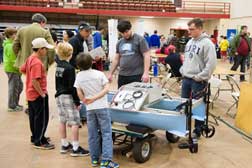 NARRAGANSETT, R.I. – March 23, 2015 – Stephen Licht knows that many people are uncomfortable with the idea of camera-toting drones flying around their neighborhoods taking pictures of who-knows-what. That’s why he supports the development of regulations that prevent the misuse of drones and that make it clear that only safe and responsible operation is permitted.
NARRAGANSETT, R.I. – March 23, 2015 – Stephen Licht knows that many people are uncomfortable with the idea of camera-toting drones flying around their neighborhoods taking pictures of who-knows-what. That’s why he supports the development of regulations that prevent the misuse of drones and that make it clear that only safe and responsible operation is permitted.
But the assistant professor of ocean engineering at the University of Rhode Island says there are a great many benign uses of flying robots, as he calls them, that can be quite beneficial to society.
To illustrate some of those uses, he and a group of URI students and faculty will celebrate National Robotics Week by participating in the Robot Block Party on Saturday, April 11, from 11 a.m. to 4 p.m. at Brown University’s Pizzitola Center. The free event for the general public will showcase the innovation and ingenuity of Rhode Island’s robotics community with more than 50 exhibits from universities, manufacturers, schools, youth groups and other organizations.
Among the robots in Licht’s exhibit will be two he purchased last year with funds from the Rhode Island Science and Technology Advisory Council for use in mapping algae blooms in Narragansett Bay. One has eight rotors, the other has four, and both have a camera pointing straight down to help in delineating the extent of algae in coastal waters. It’s a job previously conducted by helicopters, but Licht’s drones can accomplish the task at a fraction of the cost.
“We’ve also got proposals out to use flying robots to map active volcanoes in Ecuador and Indonesia and to collect water samples from catchment ponds for storm water run-off that might otherwise be hard to get to,” said Licht, who directs the Robotics Laboratory for Complex Underwater Environments at URI. “Around the U.S., drones have been used for everything from monitoring mountain roads for avalanche damage to mapping corn growth patterns on large farms. They have the potential to provide extraordinary benefits.”
Licht’s exhibit will also include what he calls a “flapping fin robot” that he helped to design at iRobot Corp. that is based on the movement of a sea turtle’s flipper. It has been tested for use in detecting unexploded ordinance and sea mines in shallow waters.
An exhibit by Chris Roman, URI associate professor of oceanography and ocean engineering, will appear at first glance to be a typical kayak. But on closer inspection it is a self-propelled robotic watercraft that can collect data on water temperature, salinity, pH, chlorophyll, and oxygen, as well as sonar images, using a suite of environmental sensors. Called an autonomous surface vehicle or ASV, it is used by URI students and researchers to help understand the conditions in the Narragansett Bay watershed and elsewhere.
“We are developing the ASV to be a combination research and teaching tool,” said Roman. “We’re looking to get students into the field more easily using the research platforms of the future.”
Roman’s vessel isn’t the only robotic boat in the University’s exhibit, however. URI engineering students will also participate in the Robot Block Party by displaying the vessel they designed to compete in the International RoboBoat Competition, a contest to design a robotic boat that can race through an aquatic obstacle course without any human controls. URI won the contest in 2011.
The Robot Block Party is organized by Rhode Island Students of the Future, a nonprofit group that promotes youth robotics and manages the First Lego League in Rhode Island. The event is also a partnership with the Humanity-Centered Robotics Initiative at Brown University. More than 1,800 people attended the first Robot Block Party last year. For more information, contact Mary Johnson at 401-249-0110 or mary.johnson@risf.net.
Pictured above: At last year’s Robot Block Party, URI ocean engineering students exhibit the robotic boat they built for the International RoboBoat Competition. (Photo courtesy of Peter Goldberg/Brown University.)

